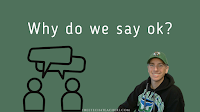17 Mar Why Do We Say Ok? – Another Question from My Daughters
Last night during dinner one of my daughters asked, “what does ok mean?” My other daughter quickly followed up with, “yeah, why do we say that?” The first question we were able to answer fairly quickly and in a way that a five-year-old can understand. The second question was a little harder to answer. I knew that I had watched a video that answered that question at some point in the last few years. So after my daughters went to bed I did a quick search of my archives which brought me to this video produced by Vox.
Applications for Education
Words of the World could be an instructive model for your own lesson combining history and language arts. Have your students pick a word or two that they think is common and research it. Then have them create their own short videos in which they explain the history of those words. You might even have them research the dialect of the areas in which they live. For example, where I live we have a Range Pond. Most people would pronounce that as range, like “home on the range” yet everyone around here pronounces it as rang as in “the bell rang.” I’m not sure why that is the case, but I would love to find out.
Last night during dinner one of my daughters asked, “what does ok mean?” My other daughter quickly followed up with, “yeah, why do we say that?” The first question we were able to answer fairly quickly and in a way that a five-year-old can understand. The second question was a little harder to answer. I knew that I had watched a video that answered that question at some point in the last few years. So after my daughters went to bed I did a quick search of my archives which brought me to this video produced by Vox. By watching Why We Say “OK” you can learn where OK originated and the roles of a presidential campaign, the telegraph, and railroads in spreading the use of “OK” until it became commonplace to say it. The video also teaches viewers why some businesses use “K” to replace “C” in product names. Vox’s video about “OK” reminded me Words of the World. Words of the World is a collection of videos featuring historians and linguists explaining the origins of and history of the use of words in the English language. The videos attempt to put the words into a somewhat modern context. For example this video about the word “guerrilla” makes reference to Che Guevara. The video I’ve embedded below explains the word “coup.” Applications for EducationWords of the World could be an instructive model for your own lesson combining history and language arts. Have your students pick a word or two that they think is common and research it. Then have them create their own short videos in which they explain the history of those words. You might even have them research the dialect of the areas in which they live. For example, where I live we have a Range Pond. Most people would pronounce that as range, like “home on the range” yet everyone around here pronounces it as rang as in “the bell rang.” I’m not sure why that is the case, but I would love to find out.Are you a tech coach or media specialist looking for some new ideas to share with your colleagues? If so, 50 Tech Tuesday Tips is an eBook you need. You can get it right here.


Sorry, the comment form is closed at this time.